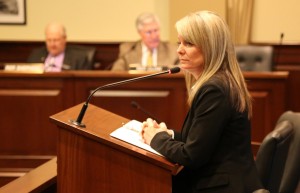Idaho’s pre-K enrollment numbers rank among the nation’s lowest — and even lag in comparison to the handful of other states that have no state-funded pre-K.
Those dismal findings come from the National Institute for Early Education Research, a New Brunswick, N.J.-based organization focused on pre-K.
In a new report, “The State of Preschool 2014,” the organization compares enrollment in Head Start, special education and state-funded pre-K. The group’s Idaho findings:
- Only 1,569 of the state’s 3-year-olds were enrolled in federal- or state-funded Head Start or special education programs in 2013-14. That makes up 6.8 percent of the state’s 3-year-olds — and represents the lowest percentage in the nation.
- Idaho’s numbers improve for 4-year-olds, but not by much. Statewide, 2013-14 enrollment in Head Start and special education increased to 3,081. This accounted for 12.9 percent of the state’s 4-year-olds — only Utah and Wyoming had a lower enrollment rate. Like Idaho, Utah and Wyoming were among 10 states that did not have pre-K programs in place in 2013-14. In other words, Idaho’s enrollment for 4-year-olds did not just rank No. 49 among all 50 states and the District of Columbia; it also ranked eighth among the states without a statewide pre-K program.
And Idaho could remain mired at or near the bottom of the national rankings, at least for the foreseeable future. While pre-K pilot bills have failed to get out of Idaho’s House Education Committee the past two sessions, other states have launched or expanded pre-K programs. This leaves Idaho one of only six states without a pre-K program.
For example, the institute’s report credits the 2014 Utah Legislature with passing a pay-for-success contracts law to partner with private entities that offer pre-K. (Idaho passed a similar contracts law in 2015, and the nonprofit Lee Pesky Early Learning Center is looking at applying the concept to reading instruction.)
Other states have taken a more conventional approach to launching pre-K. The institute report also notes that Hawaii, Mississippi and North Dakota have passed pre-K pilots since 2013-14; the North Dakota pilot passed in April.
For pre-K programs nationally, 2013-14 represented a possible “return to growth,” according to the report. Funding increased by $120 million, when adjusted for inflation — but this does not make up for pre-K cuts during the recession. Nearly $500 million were cut from pre-K programs in 2010-11.
Nationally, pre-K enrollment increased slightly in 2013-14, by about 8,500 students. More than 1.3 million children are enrolled in a state-funded pre-K program.
“State pre-K programs may have turned a corner in 2013-2014, but progress remains slow,” the report says.
While a pre-K pilot bill gained little traction in the Idaho Statehouse again this session, the debate appears to be picking up.

About 400 people attended a pre-K conference in Boise last week — co-sponsored by Boise State University’s Andrus Center for Public Policy and the University of Idaho’s McClure Center for Public Policy Research. Attendees heard about the fledgling Utah and Mississippi pre-K programs, and heard a surprising prediction from state Sen. Steven Thayn, an Emmett Republican who has opposed past pre-K efforts. “I think we’ll see something happen this next legislative session.”
State superintendent Sherri Ybarra has discussed the idea of getting federal funding for pre-K in Idaho, as an element of the state’s waiver from the No Child Left Behind education law. “We often talk about jump-starting kids into college, but we don’t talk about jump-starting kids into kindergarten,” Ybarra told the House Education Committee in March.
